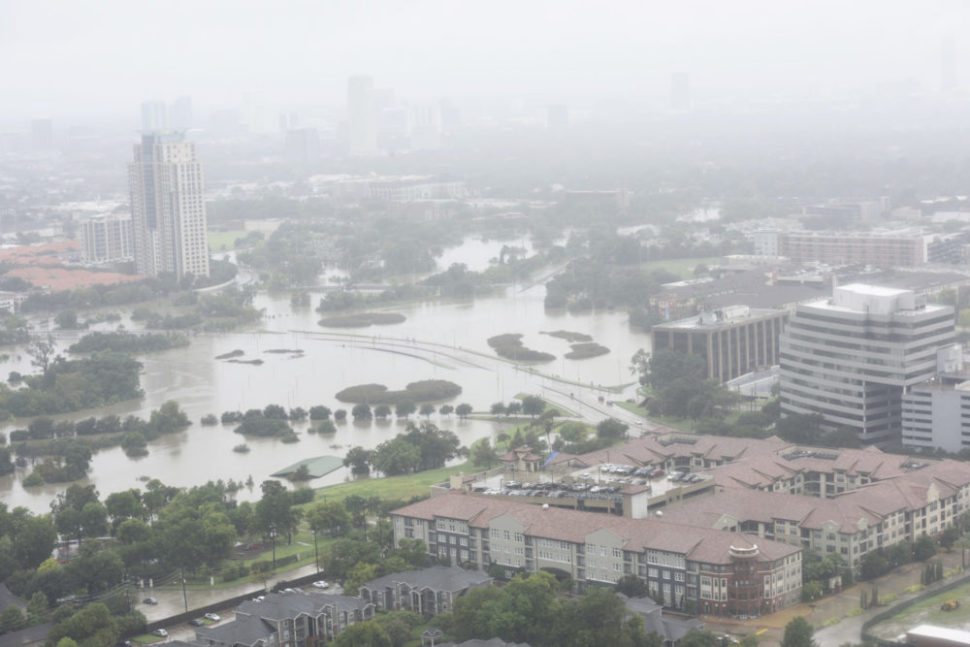Hurricane Harvey became a natural catastrophe this past weekend and continues into this week. As native Houstonians, we’re holding on, looking at survival stories from our community and starting to answer why this one is so bad.
For Houstonians and Houston-based companies like us here at Edgy Labs, the implications of this storm weigh heavy on our hearts and minds.
While some of us like Edgy Labs writer William McKinney sit tight, stranded on an island surrounded by flood waters, others wait anxiously for a boat rescue.
“The Coast Guard is piloting fan boats up and down my street because we’re the relay point to drop off refugees for rescue,” wrote Will. “If you’re the praying type, give them to my neighbors. I’m very lucky in all of this so far, but people not even a block away have lost everything.”
Another Edgy Labs contributor and his family are safe but nervously look out the window, constantly checking the levels of the flood waters rushing down their neighborhood streets.
“It’s still pouring rain and we’re getting all the upstream water today,” he updated in a message to the team. “Not only that, but there’s a storm surge at the other end of Lake Houston and the water can’t get out. My friend’s house on the block next to us just started flooding. This hasn’t happened in 100 years.”
CEO Michael Umansky has checked in as safe with his family while another one of our writers, Juliet Childers, is volunteering around the city.
For my part, a Houston native who has spent the last three years away from Space City, it’s hard to grasp what is really going on there. In 2008, Ike left me and my college roommates stranded in Downtown Houston for three days without power.
Our irresponsible youth turned the surreal event into a revelry.
We were familiar with what a hurricane could really do–hundreds of thousands of Hurricane Katrina refugees had become part of Houston’s landscape–but at that time not many of my ilk were concerned about when another 500-year flood would reach the Third Coast (the Gulf of Mexico).
Yet, now with Hurricane Harvey, Houston has experienced its third 500-year flood in three years.
A quick note: A 500-year flood is an indication of probability. That means that a 500-year flood has a 1 in 500 chance of occurring in a given year. Unfortunately, we’re not done with Harvey-esque flooding for the next 499 years.
Why Houston, Hurricane Harvey?
First, a hurricane is a type of tropical cyclone, all of which form in warm ocean waters near the equator. Hurricanes center around a warm core, or a low-pressure system much warmer than the surrounding air. The storm functions as a heat engine, turning warm ocean air into intensely powerful currents and winds.
The storm functions as a heat engine, turning warm ocean air into intensely powerful currents and winds.
Basically, a hurricane’s job is to cool the ocean down.
Check out this awesome infographic for more detailed info.
In fact, warm water is the “fuel” of a hurricane.
Combined with a near-surface, inward spiraling wind pattern, lowering pressure in the center of the storm continues to draw more and more air in at the water’s surface.
Giant thunderstorms, also referred to as rain bands, spiral out from the center in arms that look much like the arms of the Milky Way–it is these bands that have carried most of the water flooding the Houston area.
In general, hurricanes are guided by global winds, or trade winds, that blow from east to west in the tropics. Any high-pressure systems in the storm’s path can also influence its direction.
Once the storm makes landfall, the Coriolis Effect and opposite global winds called the westerlies can push the storm east rather than west.
So, why are these floods punishing Houston? Why did Harvey end up there rather than Louisiana or Florida? The answer is twofold.
First, Houston’s floods could be exacerbated by rampant development on the land that acts as a natural drainage system for this type of flooding–even though Houston’s saturation threshold is far greater than that of New Orleans. We’ll get into that.
Second, the exact landfall point of Hurricane Harvey was hard to predict. There was no clear draw for the storm towards Houston–rather it was a sum of variables including its origination point, the behavior of trade winds, and changing water temperatures.
Whether climate change and a rising global temperature have the potential to increase the destructive potential of these storms is hard to quantify–but, since a hurricane’s heat engine capacity thrives on warmer waters, it’s certainly possible if not probable.
In any case, these incredibly unlikely floods have become somewhat common in Houston.
Unlikely Doesn’t Mean Impossible: Preparation is Key
Yet, it is difficult to prepare for everything. These storms are an unfortunate reminder that mother nature can lay us low no matter how technologically advanced our community has become.
Certainly, residents of areas like Houston have to be familiar with this inevitable truth.
However, you can prepare. Here are some basic tips from Ready.gov:
- “Know where to go. If you are ordered to evacuate, know the local hurricane evacuation route(s) to take and have a plan for where you can stay. Contact your local emergency management agency for more information.
- Put together a go-bag: disaster supply kit, including a flashlight, batteries, cash, first aid supplies, medications, and copies of your critical information if you need to evacuate
- If you are not in an area that is advised to evacuate and you decide to stay in your home, plan for adequate supplies in case you lose power and water for several days and you are not able to leave due to flooding or blocked roads.
- Make a family emergency communication plan.
- Many communities have text or email alerting systems for emergency notifications. To find out what alerts are available in your area, search the Internet with your town, city, or county name and the word ‘alerts.'”
The Houston and Texas Show of Resiliency Should be a Part of Emergency Infrastructure
Houston is a vibrant and diverse community. In fact, according to the LA Times, it is the most diverse city in America. Traditionally, Texas is a politically conservative state, and the inner City of Houston is a socially conservative but politically liberal demographic.
Traditionally, Texas is a politically conservative state, and the innercity of Houston is a socially conservative but politically liberal demographic.
There are many differing opinions.
Yet, various media reports illustrate that the Houston community is putting politics aside and rallying around their shared experience to offer each other aid and assistance.
“It’s beautiful to see,” said another member of the Edgy Labs family on a group call on Monday.
Edgy Labs “Jane of all Trades” Stephanie D’Adamo (who is based in Commerce, TX) wrote, “If those of you in Houston need temporary housing or any other assistance, my home is 100% open to you. Please be safe!”
https://twitter.com/Free_Press/status/902360717390745601
Harris County Judge Ed Emmett and Houston Mayor Sylvester Turner have behaved as stalwarts and have organized authorities during this time of emergency–despite push back against criticism of less-than-adequate preparations.
According to a Houston publication, CultureMap, even TV stations were keeping their cool under pressure. Ken Hoffman writes:
“I used to suspect that TV weather forecasters hoped for a hurricane. This time, instead of predicting the end of the world, they explained what was happening, and what could lie ahead, with science. In the past, when things got close to the knuckle, I’d turn off our local stations and tune to CNN or the networks for serious coverage. Not this time. In fact, our stations had so many reporters on the street, they made CNN look like patchwork TV. This is Houston, we’ll handle it.”
Celebrities and sports figures stepped in to help as well. JJ Watt, an NFL player for the Houston Texans, started a fundraiser that raised $500,000 USD in the first 24 hours and has a goal of $4 million USD.
The Houston Rockets NBA franchise owner Leslie Alexander donated $10 million USD to the Hurricane Harvey Disaster Relief Fund. Star player for the Rockets, Chris Paul, donated $75,000 USD to the fund.
Yet, not all sources are singing the same tune. While Houston is and should be lauded as one of the most multi-cultural communities in the country, more often than not, these communities often remain divided among racial and cultural lines.
Ultimately, it is a socioeconomic concern, as Charles D. Ellison of The Root points out that lower-income families in Houston are suffering from a far less hopeful response from emergency services.
What’s more, Ellison draws attention to the fact that many of these lower-income families do not have the resources to recover from an event like this–let alone reach safety in the first place.
This woman claims she had been ignored by emergency services for days until a random, private rescuer saved her and her family on a boat.
In any case, when compared to Hurricane Katrina in 2005, Houston has cashed in on some built-in resiliency from the city’s community in responding to urban-planning security risks.
As we pointed out above, the startling majority of rescue boats in Houston are privately owned. Although this does not necessarily indicate a lackluster preparation on the part of the city, it does indicate an inspiring response on the part of its citizens.
In the end, Edgy Labs hopes everyone in Houston and Texas has found a safe place to wait out the storm. Much of our staff has, and we’ll be there to help rebuild the city with our fellow Houstonians. Hang in there, Houston. Hell and high water.
In the next part of our coverage of Hurricane Harvey, we’ll talk to experts about what preparation the City of Houston put in place for the storm and consequent floods. We’ll talk about what human factors (including real estate developments and urban planning) may have exacerbated this catastrophe, and what might be done about them in the future.



















Comments (0)
Most Recent